Due to a temporary relaxation in Israeli policy, many Palestinians traveled to Jerusalem through checkpoints during Ramadan this year. But now that Ramadan is over, it’s back to business as usual.
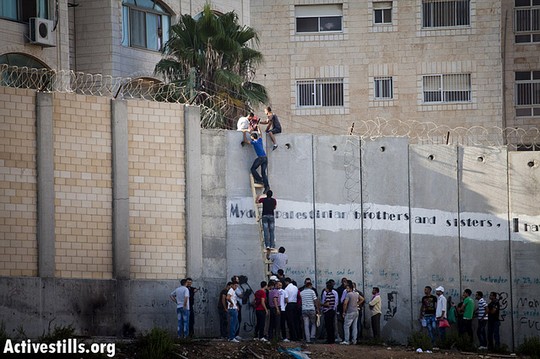
Every day, thousands of Palestinians circumvent the Israeli separation wall by crossing into Jerusalem without permission from Israeli authorities. Haggai Matar recently described this major flaw in the wall’s security rationale, even quoting a pro-barrier activist who admits:
“There’s no problem crossing the gaps in the fence and tens of thousands of illegal workers cross it back and forth every day, and there should be no problem getting suicide bombers through with them” stresses Ilan Tsi’on, co-founder of “A Fence for Life.” “So why don’t they? Because that’s the Palestinians’ choice.”
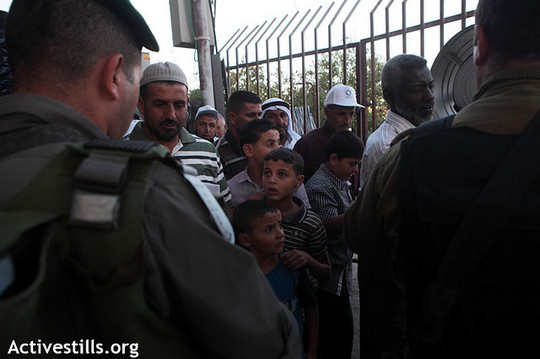
The same logic applies to the checkpoints controlling movement within territory under Israeli occupation since 1967—including East Jerusalem, which contains the Old City, the Haram Al-Sharif (or Temple Mount), and the Al-Aqsa Mosque. Though Israel unilaterally annexed East Jerusalem, no other nation recognizes the legitimacy of the action and international consensus still regards it as occupied Palestinian territory. That so many Palestinians routinely risk arrest and prison by circumventing these checkpoints—without incident—shows the absurdity of their security rationale. At the same time, the vast majority of Palestinians who try to play by the rules of occupation remain restricted under Israel’s matrix of control.
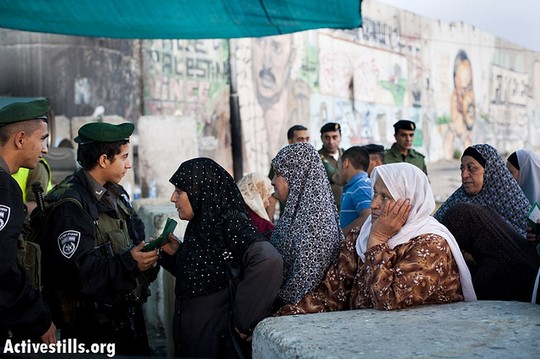
B’Tselem describes the checkpoint regime as follows:
[E]ven if the restrictions were intended to prevent attacks inside Israel … the policy would be illegal given its sweeping and disproportionate nature, which makes it prohibited collective punishment. Furthermore, Israel’s policy is based on the assumption that every Palestinian is a security threat, thus justifying restrictions on the person’s freedom of movement. This racist assumption brings with it the sweeping violation of human rights of an entire population based on national origin. As such, the policy flagrantly breaches international law.
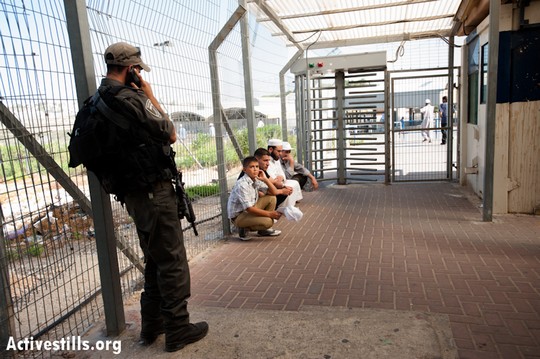
But on Fridays during Ramadan this year, Palestinians streamed to Jerusalem in even greater numbers due to a relaxation in Israeli restrictions. Authorities allowed men over age 40 and boys under age 12 access without a permit. And on the last Friday of Ramadan, women of all ages were granted unrestricted entry. According to human rights organizations that monitor checkpoints, searches were generally sporadic and cursory, and tens of thousands more Palestinians entered Jerusalem this year than during Ramadan in 2011. One activist even declared that in 10 years of monitoring, it was the “best” she’d ever seen.
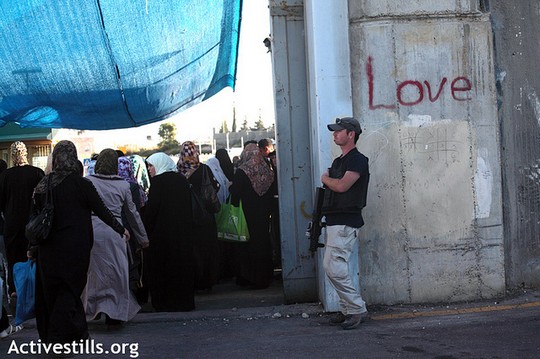
From a Ma’an News report:
[T]he Coordinator of Government Activities in the Territories, Maj.-Gen. Eitan Dangot, met with representatives of the Palestinian Authority and updated them on the plans for Ramadan.
“IDF soldiers have been given orders to show special consideration toward the Palestinian residents of the Judea and Samaria region and, wherever possible, to refrain from eating, drinking and smoking in public, more so at the various crossings so as to demonstrate a high level of respect and understanding.”
Israeli soldiers checking IDs would even say Ramadan kareem (essentially, “happy Ramadan”) or ahlan wa-sahlan (“welcome”) to Palestinians they allowed to pass from one part of their occupied territory to another. Many Palestinians would repeat the phrases among themselves with unmistakable sarcasm.
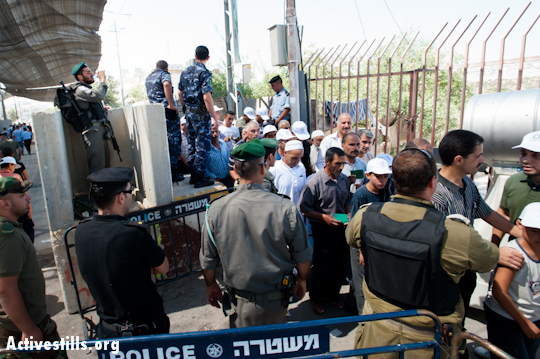
Yet, as the crowds streamed by, it was easy to get caught up in the exuberance of people entering Jerusalem for the first time in years—including children taken by their parents for the first time in their young lives. As Reuters reported:
“I’m rejoicing and so happy to be in Jerusalem after 10 years of not visiting,” said 42-year-old Mohammed Rashid, from the West Bank town of Yatta, sipping a midnight draught of coffee in a brightly lit old city arcade.
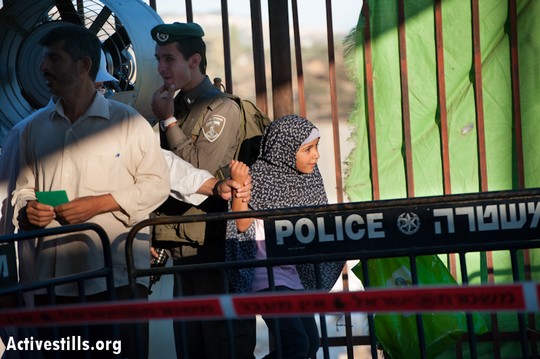
The Israeli Coordinator for Government Activities in the Territories’ said that whereas last Ramadan it had handed out just 16,700 entry permits, this year it had distributed 123,514, and had also slashed the age limit.
A COGAT spokesman said the change was “due to the security situation”, adding that Israel wanted “to support and strengthen the economy and allow Palestinian’s freedom of religious worship in the maximum”.
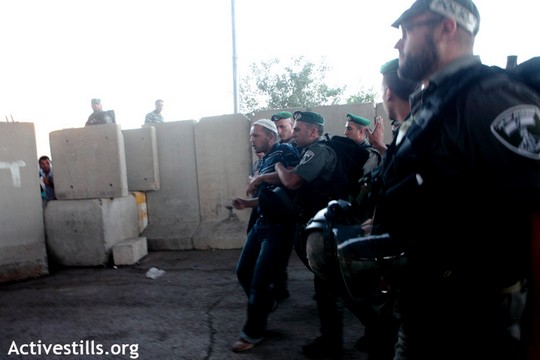
However, the new rules only apply for the last few days of Ramadan, after which the old restrictions come back into force. “Why am I allowed in now, but next week I’m not?” Rashid asked.
Palestinian Christians ask the exact same question after their permission to enter Jerusalem during Christmas or Easter expires. If the “security situation” allows access during a holiday, why is collective punishment required during the rest of the year?
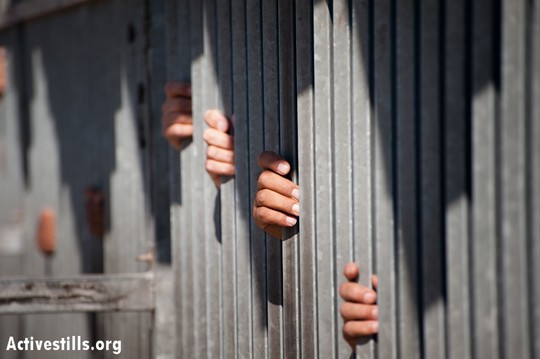
Even under the relaxed Ramadan restrictions, many Palestinians were still prevented from visiting Jerusalem. Countless youths had to document, beg, or otherwise attempt to prove that they were under age 12, and most young men were excluded—a huge percentage of the Palestinian population. Not to mention Palestinians from Gaza, who did not benefit at all from the changes at Bethlehem and Qalandiya checkpoints. And the men, women, and children who were allowed to pass were still often subjected to humiliating and intimidating treatment by heavily armed Israeli soldiers. A “kinder, gentler” checkpoint is still a checkpoint.
And now, Ramadan is over. Eid mubarak. Back to business as usual at Bethlehem, Qalandiya, and more than 500 hundred other checkpoints, roadblocks, and other obstacles to Palestinian movement in the occupied territories.
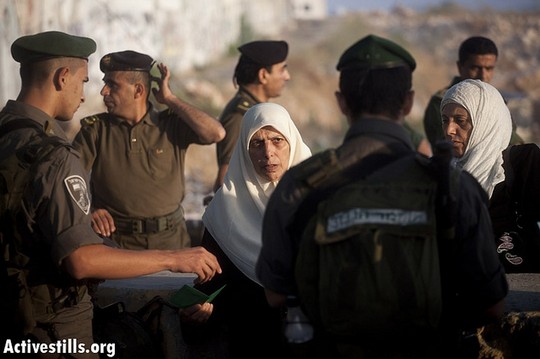
Activestills is a collective of Israeli, international and Palestinian photographers, united by a conviction that photography is a vehicle for political and social change. To stay updated on our latest images, like Activestills on Facebook or follow @activestills on Twitter. You can also visit our flickr photostream.

